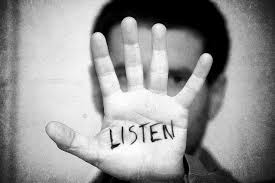THE ART OF LISTENING
Larry King once said “I remind myself every morning: nothing I say this day will teach me anything. So if I’m going to learn, I must do it by listening”. Very wise words indeed from a talk show host!
However, it seems we are all so obsessed with being heard that we are forgetting the art of effective listening. As the world is getting noisier with more emails, e-books, white papers, tweets, websites, webinars, advertisements, blogs, podcasts and direct marketing campaigns we are all desperately trying to yell louder in order to have our own message heard.
We can’t possibly listen to everything and it seems to be that most people are finding it increasingly difficult to differentiate between quality information and thinly veiled sales campaigns. We are frustrated trying to wade through the tsunami of information that hits us through multiple mediums, and taking the time to find the right person with the right information, and then be able to focus on it with so many other things on our to-do list stalking our subconscious is becoming more and more difficult.
Listening is one of the most important skills we can learn. Those with young children in their lives or new people in their businesses will understand how difficult it is for toddlers or novices who don’t listen to learn, grow and develop. This is true of all humans; even if you are currently competently plugging along in your life or role, your skill base and relationships can’t grow and develop unless you learn this vital skill.
Here are a few tips to help you slow down and rediscover the art of listening well.
Be present. Put your phone away, turn your emails off, remove all distractions and be in the moment when you are with customers, colleagues, family and friends.
Show you remember. Good listeners make it a habit to remember previous conversations and refer back to them.
Make eye contact. They say the eyes are the window to the soul, so when someone is trying to connect with you, let them fully engage by maintain a comfortable level of eye contact.
Allow people to finish. Interrupting is as disrespectful as it is annoying. Learn to wait until it is clearly your turn to talk before you launch yourself and your opinion like a grenade into the conversation. Waiting until it is your time to talk makes for a much deeper and more engaging discussion.
Allow people to tell their story. Always jumping in with your own tall tale can make the speaker feel bad and take the shine off their story. If you have something you would like to share, don’t be afraid to do so, but be aware that story telling need not be a competition.
Ask questions. Asking relevant questions shows the speaker you are not only listening but that you are also interested. The questions can be to clarify your understanding or find out more about the topic at hand, but either way, they will enable you to engage on a much deeper level.
Be receptive. Even if you don’t like what you are hearing or you are listening to negative feedback, it is much more effective to lay back in your discomfort and try to keep an open and humble heart. When you get defensive or attack back to try and protect yourself, relationships can be damaged.
Remember, we have two ears and one mouth and we should be using them in that proportion.
Between managing Auridian Training & Consulting and travelling as an international speaker and business consultant, Meg Salter is the proud mum of two delicious and spirited young children who keep her happy, grounded and always in need of a beverage.
If you would like more information about how to develop effective communication strategies contact Meg on meg@megsalter.com.au or call her on 0414 503 887.


